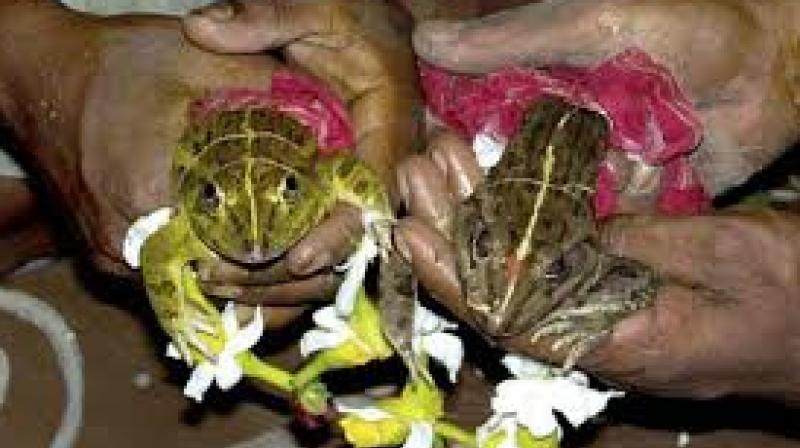Frog wedding a tradition in Rayalaseema
The amphibians are married to appease Lord Varuna.

ANANTAPUR: In addition to spiritual rituals involving poojas and homas, people from the rural parts of drought-hit Rayalaseema employ interesting traditions to appease the rain gods every year. Some of these traditions include the performance of frog and donkey marriages, and the praising of rural gods. Anantapur district and its surrounding regions have been symbols of drought for many centuries. Records for the past 120 years indicate that the region has been drought-hit for over 80 of those years. Under these conditions, people perform various rituals to attract the rains.
Thimmappa, an octogenarian from the Rolla area, said that the marriage of frogs was a part of the tradition of Anantapur district and the surrounding areas of Karnataka. “We have been reeling under drought for a majority of years, for the past century. The tradition of performing frog weddings is a regular feature in every village during peak season,” he said. Banking on this ancient belief, farmers organise the age-old ritual in many parts of Anantapur district. If the monsoons are delayed, the number of sentimental offerings increases.
Venkata Subba Reddy witnessed frog marriages in the Madakasira area. “Whenever the monsoon is delayed, frogs and donkeys are wedded to appease Lord Varuna, the rain god, and the saviour of farmers. The villages are parched, and we decide to conduct the frog wedding,” he said. Frogs are considered particularly significant to the rains, because the abundance of this amphibian family increases during the monsoon.
Vempalle Gangadhar, a renowned writer from Rayalaseema, said that in addition to the wedding of frogs and donkeys, several other traditions such as rokali sangyam, kadava sangyam, govu sangyam and vemaiah swamy gurram were also invoked, to appease the rain gods. “Normally, stone grinders, or rubbu rollu, break down at high temperatures. There is a tradition that people don’t keep the broken grinders in the village. They throw them away at the borders of other villages and consider them karavu rallu,” he said. He said that villagers also offered prayers with empty pots, and this tradition was called kadava sangyam, which could be witnessed in every part of the region.

